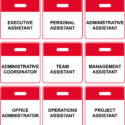
Kemetia Foley outlines the steps that you can take to successfully handle a demanding workplace
There are many stories shared by peers about demanding workloads and the impact on their health, their families, and their lives. Many have resigned themselves to being chronically tired or sick.
There are also the tales of warning such as when we learn of a colleague’s stubborn determination to keep pressing on in spite of the clear evidence of a crash coming, and they fall prey to a freak accident or a long-term illness as their body forcibly removes them from their work. What’s driving these incidents? I confess I suspect the days of long work and the pressure to keep up are not going away. So, how do you recognize and acquire the tools to manage the overall impact on your energy levels and health, especially if you love the work you are doing?
The evolution of the administrative field has changed how the responsibilities of big projects are handled. Now more than ever, administrative professionals need to manage their energy levels and health to keep pace through the peak work cycles, burnout, and company morale issues. While not necessarily obvious to the casual observer, these workplace challenges impact the energy, effort, focus, and productivity of the entire staff.
Industry Peak Work Cycles
It makes sense that the calendar flow of certain industries may impact the ability to sustain focus and energy. Peak season encourages working straight through, working extra hours, more to do. There are industries which do not have a predictable ‘peak’ season. Here are some examples of industries that do:
Hospitality
There are three chunks of the calendar year in which hospitality is slammed.
- Summer: weddings and vacations
- Spring and Fall Conference Seasons for larger properties and
- End of year holidays like Kwanzaa, Christmas, Hanukkah and the New Year.
They may also be impacted by the cultural traditions of the location.
In the hospitality industry, it’s usually all hands on deck when needed. Administrative staff are fielding loads of calls and monitoring sales and information inboxes, all of which require prioritization and swift distribution. Nine times out of ten the hotel operations or sales support staff bear the burden of first contact with an unhappy customer.
Education
In the United States, many educational institutions follow a September through August cycle, with most of the volume coming in late summer as schools and universities prepare for their next group of new students and instructors. This cycle impacts administrative staff responsible for everything from processing new hire paperwork to assisting parents with registering children for school, to answering questions regarding bus transportation. Summer vacation, indeed.
Emergency Room
I remember the first time I heard the term ‘Trauma Season’. I had just started working to support our Emergency Room Director and team, which included the director of the medical flight team (otherwise known as medical air service). It was mid-March and the ER had dealt with a rash of motorcycle and car wrecks. When I asked why he thought there were so many in a row, he said “this is the first warm weather, people get happy, they get reckless and drive too fast. Happens every year: Trauma Season.” This cycle impacts billers, coders, and medical secretaries.
Finance
How about tax season? Of course, this is not the only busy time for assistants in the finance world, there are the monthly or quarterly financial reports to be done. In the US this peak tends to hit late November into December for end-of-year, closing the books time of year, and continues through annual audits, board reporting and for citizen tax preparation up through April.
Burn-Out
In Jennifer Moss’s December Harvard Business Review article (Moss, 2019), reviewing employee turnover, she notes that burnout is now recognized as a workplace phenomenon by the World Health Organization:
“Burn-out is a syndrome conceptualized as resulting from chronic workplace stress that has not been successfully managed.” (World Health Organisation, 2019.)
Moss’s article also reflects upon Dr. Christina Maslach’s well-known research and expertise on the topic of burn-out, and goes on to share the findings of this Gallup survey study (Maslach, 2018) reflecting the top 5 causes of burnout:
- Unfair treatment at work
- Unmanageable workload
- Lack of role clarity
- Lack of communication and support from the manager
- Unreasonable time pressure
I look at that top 5 list and 2 through 5 pretty much describe the daily work culture of many administrative professional peers.
Company Morale
Company morale is not the burden for the assistants to bear. However, assistants are often recruited to improve the morale of the workplace either through team event planning or special holiday-based events. These events intended to fight cynicism and negativity can often only add to morale issues as staff are ‘voluntold’ to participate.
Assistants are the employees most in-tune when company morale is sinking fast. What the cycle entails here is that as morale goes, staff go. Turnover increases and support staff are asked to take on additional work until replacements come aboard. (See point 2 above.) It can enable a Sisyphus-type work culture. And to be fair, this is not always 100% the company’s fault. If the economy, the industry, or the geo-politics are pressing, the leadership may focus on survival of the company first, employees second.
Taking Action
Resignation to or apathy about work environments is relatable in these circumstances. However, the only catalyst for change is taking action in ways that will personally improve energy and health, as well support better decision making as to whether to make a larger change such as finding a new position. Let me be clear here. Not all administrative professionals see the above issues as issues. They can crush a 65-hour work week, get in a 10-mile run and shrug-off constant turnover in their organizations. I say, kudos to them. I have tremendous respect for these individuals.
For those seeking better ways to manage the issues/stressors above, let’s look at some options:
Peak Cycle
If you love the industry but hate the peaks of the peak-cycle, it may be time to do a real Pros/Cons chart to gain a better perspective of whether this industry is still for you. Or, are there options to better navigate the hours during peak-cycle? For example, can you split your workday in order to accomplish personal appointments and tasks? Is there an option to earn time off in lieu? Are there options to work four 10-hour days, thus leaving you with a weekend to unwind? Can you negotiate a boundary with your organization for not taking calls or checking email during this peak-cycle time? What about splitting on-call responsibilities with a co-worker, alternating days of responsibility for email or work calls after 6 pm?
What about your physical health? Are you eating well, getting enough sleep, cutting back on alcohol and/or caffeine? Getting exercise? Making improved health choices can improve the ability to get through huge ups/downs, chronologically and emotionally.
Burn-out
What about burn-out? That’s a tough one. Usually when an individual reaches this point, it is tough to remain in the same company or the same position and contribute quality work. Let’s go back to those top 5 causes and review.
Unfair Treatment at Work
Is this a harassment issue, a workplace hostility issue or a lack of setting expectations and boundaries due to fear of conflict? The best bet is to document, document, document. Everyone has their own definition of ‘unfair’. If you are single with no children and happen to be the only staff member requested to work overtime, document it. Prove it. Unless you can make a solid, unemotional case to Human Resources or the company ombudsman, you may be fighting a perceived ‘emotionally-based’ battle. Present a fact-focused argument.
Unmanageable Workload
Why is it unmanageable? Define it. Make a financial case for assistance or a shift in duties. Perhaps you have a radical solution or suggestion on how it can improve. Make it. Don’t keep it to yourself. The key here, again, is to act.
If the message received in return from your supervisor or management is that ‘everyone is under water’ or ‘get used to it’, then the ball is in your court. You have a decision to make.
Lack of Role Clarity
Is this new? Was there an organizational change and with duties added? Are you reporting to more than one executive? Time to draw up your job description and responsibilities as YOU see them. Schedule to meet with both executives at the same time. Try to come to an agreement as to exactly what your role is. If an agreement is reached, it’s imperative that it’s expressed either through a memo to the full team or by the executives, preferably in a public format. When and if this role clarity wavers, it’s up to you to bring it to the forefront in a non-confrontational, matter-of-fact dialogue with your executive(s). This is often easier said than done.
Lack of Communication and Support from the Manager
This is a tough one. It’s impossible to manage the emotional maturity of your executives. Instead, manage your understanding as to what communication and meetings are needed, and why. Do not hint or infer. The conversation needs to be direct and in private. If there is no hint of reciprocity or collaboration coming, the behavior is not going to change. Is this a viable work environment for you?
Unreasonable Time Pressure
Give me a moment while I stop holding my side from my side-splitting laugh that this can be managed. This is a behavior practice which is well-established lore in the administrative field. Last minute everything. There are admins that are addicted to this like true adrenaline junkies. It allows them to prove time and time again how valuable they are to the organization. Proactive actions can be taken to mitigate the impact of the last-minute surprise request. What action can the non-junkies take to address this phenomenon?
- Consider taking a course in project management to improve ability to anticipate potential last-minute demands
- Block and guard calendar time during peak-cycles to allow ‘give’ for last minute items
- Engage assistance from colleagues. Odds are that you’ll be returning the favor at some point
Company Morale
Have you navigated an industry down-turn? Many of us did during the Great Recession in 2009. Morale was in a very bad place for most companies.
Here are some ways to keep positive energy and focus when company morale is draining the souls of the staff.
Voluntary Potlucks and Brown-bag Lunch Learning
These low-cost networking opportunities can build camaraderie but avoid gossip and negative talk. Keep the focus on the food, the fellowship, and the learning.
Shredding Events
There are few things that make for happy people better than to get rid of papers and things they don’t need. The amazing emotional impact of a neat and tidy office space is immeasurable. Most organizations limit ‘Shred’ weeks to company materials only, but you may be able to convince them to allow employees to pitch in a few dollars to be able to bring their own materials from home for shredding.
Water or Walking Challenges
These are two health-related challenges that are simple to implement and track with minimum work. The benefit is better mental and physical health. The company benefits by sharing this company-wide effort with the health insurance broker, and I suspect with fewer workdays lost to illness.
No How-to Manual Exists
Peer-to-peer discussions of workload and work environments confirm that no true “How to Handle a Demanding Workplace” manual exists. Acknowledging challenges, sharing concerns in a safe and trusting environment, and seeking the counsel of the more experienced among us is the equivalent of taking the highway rather than the backroads when it comes to navigating the workplace journey. As Diana Brandl likes to say, “We’re all in this together”.
If you’re facing a particularly demanding workplace or workload, reach out to a peer you respect and trust. They just might have an extra suggestion or two to smooth out the path.
Bibliography
Maslach, D. C. (2018, July). Retrieved from https://www.gallup.com/workplace/237059/employee-burnout-part-main-causes.aspx
Moss, J. (2019, December 11). Burnout is About Your Workplace and Not Your People. Havard Business Review. Retrieved from https://hbr.org/2019/12/burnout-is-about-your-workplace-not-your-people
World Health Organisation. (2019, May 28). Retrieved from https://www.who.int/mental_health/evidence/burn-out/en/














Good read Kem. well done.
Great article, Kem – really highlights many things for all of us to think about!
Kem, thank you for this article. You hit so many nails squarely on their heads. This should be compulsory reading for HR professionals and admins alike. I love the term ‘voluntold’, not heard that one before.
Thanks, Helen. I’m glad I could share a new phrase! Being “voluntold” is something I’ve encountered too many times to count. Hope you are well and we are able to cross paths again soon.